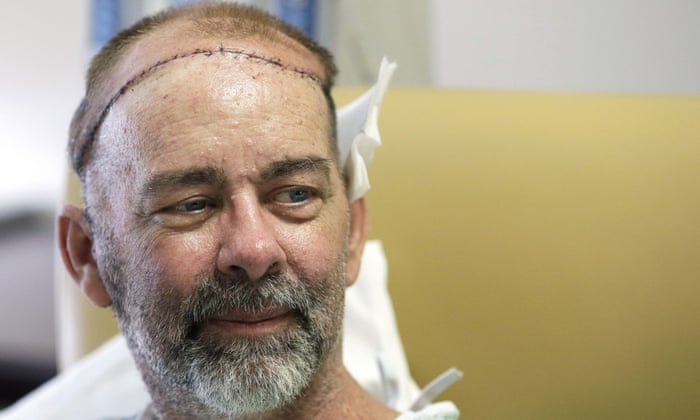Alternatives
Faustmanlab.org
Pubmed.org faustman DL
Faustman has the ability to make a peptide to cure type 1 diabetes
Bcg will kill the immune cells that are causing James boysen'sbody to attack itself
He is buying timeatgreatcostto his body
Bet. On Bcg and Faustman
Need atargetto shoot ?
I amavailableyobeshoton YouTube
If Bcg worksformeitmaywell work for you
World-first skull and scalp transplant gives Texas man 'new lease on life'
Recovering cancer patient James Boysen ‘forever grateful’ after receiving donor top of head on the same day as kidney and pancreas transplant

A man whose cancer left him with severe damage to the top of the head has received what his doctors in Texas have described as the first skull and scalp transplant.
James Boysen, a 55-year-old software developer from Austin, received the craniofacial tissue transplant at the same time as a kidney and pancreas transplant at Houston Methodist hospital on 22 May in surgeries that lasted nearly a day.
“For this patient, it means a new lease on life,” said Jesse Selber, a reconstructive plastic surgeon who was the co-leader of the team that performed the intricate surgery.
“He had series of cancers of the scalp and skull that were treated with various surgeries and radiation that left him with a large wound that was all the way down to his brain.”
A photo of Boysen after the surgery shows him with sutures in a ring around the top of his head, about an inch (2.5cm) above his ears, where the transplanted skull and scalp were attached.
Boysen had already had kidney and pancreas transplants, and those organs were failing. The surgeons conducted all the transplants at the same time using the same donor because it offered the best chance of preventing organ and tissue rejection.
“I’m amazed at how great I feel and am forever grateful that I have another chance to get back to doing the things I love and be with the people I love,” Boysen said.
He was released from the hospital on Thursday and will spend the next few weeks at a residence used by those recovering from transplant surgery.
Co-ordinating the transplants and planning the surgeries took more than two years. More than 50 healthcare professionals were involved including microsurgeons, neurosurgeons and reconstructive surgeons, said the MD Anderson Cancer Center.
No comments:
Post a Comment